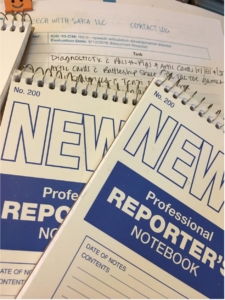I’m a speech-language pathologist and a former journalist. I love both. I’m fortunate in that respect. I choose two careers that have allowed me to work with people and two careers that offered me the chance to help others.
 Frequently when I encounter a conversation about my professional path, people question why I made such a significant change from journalism to speech-language pathology. It always gives me a bit of chuckle. While others view the two professions as vastly different, I can likely list a counterpoint of why they are alike.
Frequently when I encounter a conversation about my professional path, people question why I made such a significant change from journalism to speech-language pathology. It always gives me a bit of chuckle. While others view the two professions as vastly different, I can likely list a counterpoint of why they are alike.
Both involve interacting with people. Both involve communication. Both involve communication that is strained. In journalism, I often communicated with people in crisis who were not experiencing their best moments in life. In speech therapy, I communicate with people who also may be in crisis for different reasons–maybe they are recovering from a stroke or a traumatic brain injury; or they are learning how their child’s communication skills are not advancing as expected; or they are dealing with talking with a stutter.
Both also involve helping others and promoting change. In journalism, my favorite stories were those that exposed a problem (people were being harmed/treated unfairly). Such stories often impacted change for the better through improved policies/procedures to stop whatever the injustice may have been. Sometimes this was on a small scale and sometimes it was on a much larger scale. It felt good to know my research and writing could help others. In speech therapy, my favorite part is watching the proverbial light bulb go on with my clients–that moment when everything I’ve taught and they’ve learned comes together and progress is made. It’s motivating to both of us and it promotes a positive change in their life.
Both also involve research. I love learning. I picked two careers that allowed me to continue learning each and every day. In journalism, I researched topics I might not have otherwise in preparation for interviews, stories and projects. In speech therapy, I research new evidence-based techniques, the latest studies that are happening in the field and about child development and the constantly changing legislation that impacts service-delivery and coverage. I love learning from others, which is something I have been able to do in both careers as well. As a journalist, I interviewed experts frequently. As a speech-language pathologist, I have built several networks of other speech therapists as well as related professions, such as occupational therapists and child psychologists. These networks help me improve my therapy skills as well as techniques and lesson-planning.
Both require a lot of note-taking and writing. In journalism, putting together all of the information gathered for stories (research + interview information) required organization and writing. In speech therapy, there is data collection during sessions (anecdotal + tracking correct/incorrect responses), lesson-planning and therapy notes that must be written afterward to provide information about the client’s performance and outcome. There are speech and language evaluation reports to write; progress notes; and exit paperwork when therapy has been successful and the client is ready to graduate.
I could continue to share more reasons, but I think this supports my point. Journalism and speech therapy are not so different, contrary to popular belief.
